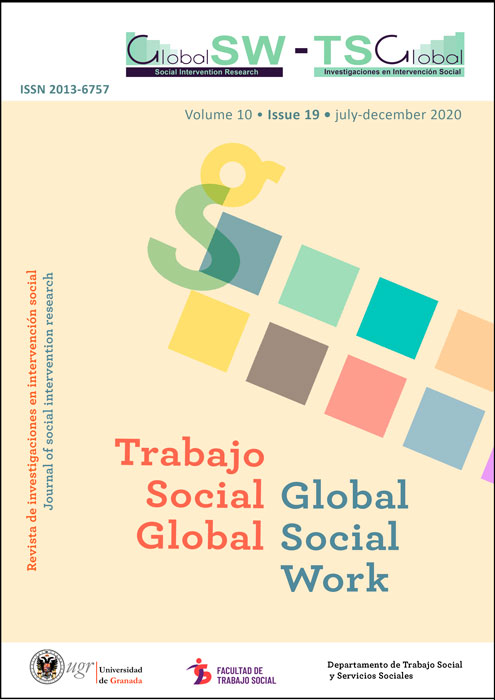Social work with single-mother families: professional assessment of their needs from the front-line social services
DOI:
https://doi.org/10.30827/tsg-gsw.v10i19.11523Keywords:
single-mother families, single-mothers, gender perspective, needs assessment, social intervention strategiesAbstract
The study is focused on those households in which the mother alone takes care of her dependent children, known in Spain as “monomarentales”. This is a new concept, which has been introduced in order to give visibility to the feminine nature of single parenthood and denounce their situation of vulnerability. In fact, these family groups are exposed to a higher risk of poverty and social exclusion. For this reason, they go to Social Services more frequently. On the basis of these premises, an exploratory study was carried out with a double objective: on the one hand, to find out the professional assessment that social workers of front-line Social Services make about the situation of needs experienced by the single-mather and, on the other hand, to identify new ways of social intervention, from the point of view of the professionals who work with these families. In order to achieve both objectives, a synchronic and local study has been chosen, based on a qualitative methodological desing that is organized in two phases. In the first one, a semi-structured in-depth interview has been conducted with a group of social workers who regularly attend to mothers in front-line Social Services. In the second, a discussion group has been carried out, integrated by these same professionals. The results allow us to systematize their experience with single-mother families and to specify new strategies of social intervention that are innovative.
Downloads
References
Avilés, M. (2013). Origen del concepto de monoparentalidad. Un ejercicio de contextualización sociohistórica. Papers. Revista de Sociología, 98(2), 263-285.
______ (2015). La monoparentalidad masculina en España. Madrid: Centro de Investigaciones Sociológicas (CIS).
Cantó, O. y Ayala, L. (2014). Políticas Públicas para reducir la pobreza infantil en España: análisis de impacto. Madrid: Unicef Comité Español.
Corral, E. (2008). La familia monoparental y el interés del menor. Actualidad Civil, 22, Sección A, 2008, tomo 2.
Esping-Andersen, G. (22 de noviembre de 2001). La necesidad de una nueva política de familia. El País. Recuperado de
https://elpais.com/diario/2001/11/22/opinion/1006383607_850215.html
European Commission (2008). Child Poverty and Well-Being in the EU: Current status and way forward. Luxembourg: FRA, European Union Agency for Fundamental Rights.
Eurostat (2018). At-risk-of poverty rate by detailed age group - EU-SILC survey. Luxembourg: European Commission.
Fernández Maíllo, G. (coord.) (2019). VIII Informe sobre exclusión y desarrollo social en España 2019. Madrid: Fundación FOESSA.
Flaquer, L.; Almeda, E. y Navarro, L. (2006). Monoparentalidad e Infancia. Barcelona: Fundación La Caixa, Colección Estudios Sociales, núm. 20.
Instituto Nacional de Estadística (2019a). Encuesta Continua de Hogares. Madrid: INE.
_______ (2019b). Encuesta de Población Activa – EPA. Resultados anuales. Madrid: INE.
______ (2019c). Encuesta de condiciones de vida – ECV. Resultados nacionales. Madrid: INE.
Lorenzo Gilsanz, F. (coord.) (2014). VII Informe sobre exclusión y desarrollo social en España 2014. Madrid: Fundación FOESSA.
Marí-Klose, P., Marí-Klose, M., Granados, F.J., Gómez-Granell, C. y Martínez, A. (2009). Informe de la Inclusión Social en España. Barcelona: Fundación Caixa Catalunya, Obra Social.
Marí-Klose, P., Marí-Klose, M., Vaquera, E. y Cunningham, S. A. (2010). Infancia y futuro. Nuevas realidades, nuevos retos. Barcelona: Fundación La Caixa, Colección Estudios Sociales, núm. 30.
Real Decreto-ley 20/2020, de 29 de mayo, por el que se establece el ingreso mínimo vital. Boletín Oficial del Estado, núm. 154, de 1 de junio de 2020.
Sastre, A. (2015). Más solas que nunca. La pobreza infantil en familias monomarentales. Madrid: Save the children.
Unión Europea (2010). La Plataforma Europea contra la Pobreza y la Exclusión Social: Un marco europeo para la cohesión social y territorial. Bruselas: Comisión Europea
Downloads
Published
How to Cite
Issue
Section
License
Authors publishing in this journal agree to the following terms:
- Authors retain their copyright. They guarantee to this journal the right to a first publication of the work submitted to initiate the editorial process.
- Authors know that their work is published under a Creative Commons License which allows others to share it, with a recognition of the work's authorship and its initial publication in this journal.
- Authors share with Global Social Work explotation rights of the work that has been published in this journal, authorizing the execution of a free reproduction, distribution and public communication. Authors know that their work will be stored on servers and reproduced in digital format for inclusion in institutional repositories and databases that will facilitates free access to the full text of the work.
- Authors may distribute the version of the work published in this journal (for example, to an institutional repository or publish it in a book), with the explicit acknowledgment of its initial publication in this journal.
Copyright on the texts published in Trabajo Social Global -Global Social Work, as well as editorial policy of the journal refering to self-file and deposit in institutional or thematic repositories, are identified in the database





















